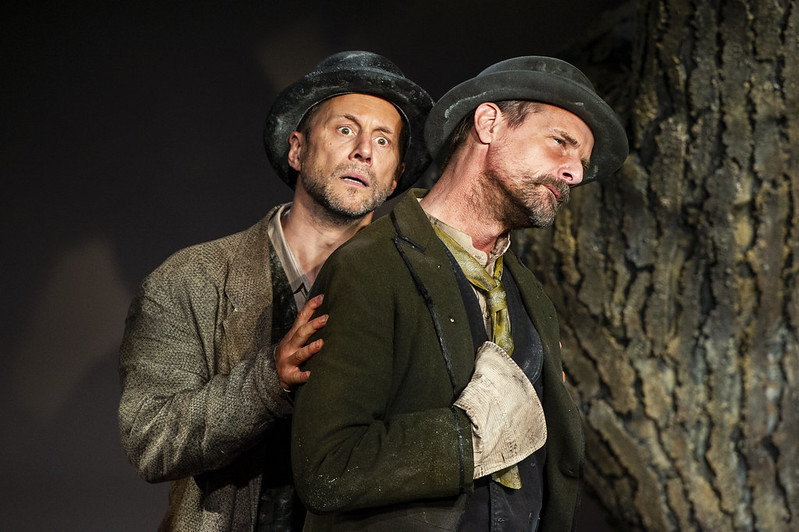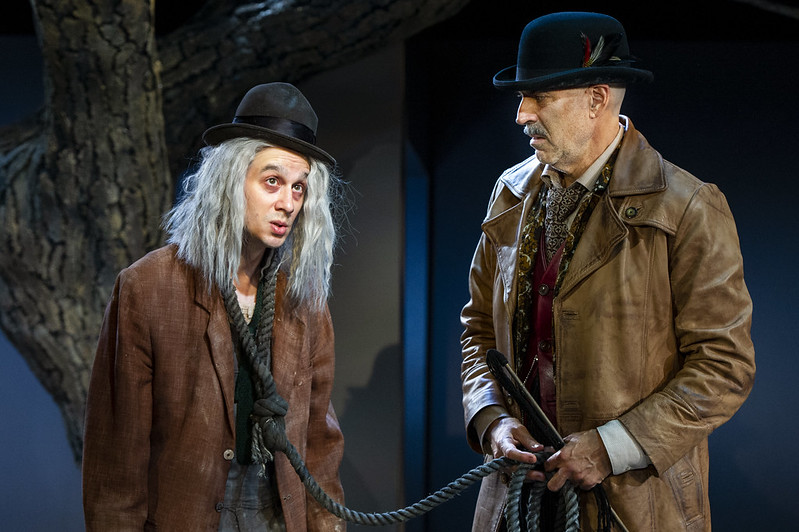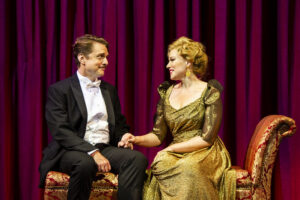An esteemed scholar once wrote about “Waiting for Godot” that “We all bring to Samuel Beckett’s play whatever is uppermost in our minds.” As tidy as that seems, my “Godot” experience has been the opposite…or reverse: I leave performances with fresh thoughts and concepts uppermost in my mind – and different ones every time. The play is soul food for the brain and, while challenging on a traditional level (no plot or resolution), it is only as complex as you make it. In its way, it is quite musical, and trying to analyze every note is a fool’s errand. I saw it last week at Barrington Stage Company in Pittsfield, Massachusetts, the heart of beautiful Berkshire County.
Two apparent tramps, Estragon, nicknamed ‘Gogo’ (Kevin Isola), and Vladimir ‘Didi’ (Mark H. Dold), are waiting for the mysterious Godot, who [spoiler alert] never arrives. The two banter and quibble, largely in existential non-sequiturs. They are joined in portions of each act by another odd couple: would-be aristocrat Pozzo (Christopher Innvar) and his much-abused, tethered slave Lucky (Max Wolkowitz).
Running through September 4, the BSC production is a faithful rendition of the playwright’s intent. That may seem like faint praise (or less), but consider: Beckett specified, as his estate continues to do (he died at 83 in 1989), not only strict adherence to the dialogue as written, but also that the many indicated pauses and detailed stage directions (one character, for example, advances “with short, stiff strides, legs wide apart”), be followed to the letter. With the mandates as a starting point, BSC’s director Joe Calarco and the cast mine the text for not only its considerable humor, but also its nuggets of rational observations.
Not unlike Laurel and Hardy, Gogo and Didi must be different from one another as well as a believable team. Isola and Dold do not miss a beat of the intricate text or the vacancy of the sharply timed, just-long-enough pauses. There is plenty to amuse, some of it silly (“Give me a carrot…it’s a turnip!” “Oh pardon. I could have sworn it was a carrot.”) and some thinly veiled profundity (“…I wasn’t doing anything.” “Perhaps you weren’t. But it’s the way of doing it that counts…”). Combined with spurts of manic scurrying about, the two actors are fine partners.
Pozzo and Lucky’s relationship, enacted broadly by Innvar and Wolkowitz, becomes more troubling (the characters, not the actors, who are exceptionally good) with every nasty remark directed at the disturbingly subservient Lucky. Repeatedly called a pig, and literally kicked around, Lucky is mute until he thinks aloud (“shouts his text,” decreed Beckett), rendering a three-page monologue that randomly references heaven and hell, tennis and football, and the “skull of Connemara,” which remark inspired Martin McDonagh’s 1997 play with that title. (Beckett’s reach spans decades.) Wolkowitz delivers the massive speech flawlessly.
This production pronounces Godot as GOD-oh, rather than Go-DOH, as has been and continues to be more common. (BSC artistic director Julianne Boyd even pronounced it Go-DOH in two curtain speeches.) This was my second time with GOD-oh, said to be the English pronunciation, as opposed to the French. The Irish born and educated Beckett, having soured on Ireland, wrote the play in French; he was also his own translator into English, rendering the script unassailable, and while many consider Godot to be a stand-in for God in either pronunciation, Beckett himself called it a firmly atheist play, which does not mean, of course, that Gogo and Didi are not waiting for God. But GOD-oh tilts the balance. It is, after all, a proper name, albeit in French. One would not anglicize Chanel into CHAN-el in an otherwise English language text.
In 1956, New York Times critic Brooks Atkinson was “fairly certain that Godot stands for God.” After seeing (or reading) the play, you might agree with that assessment. Or you might not. Or you might just be left to ponder over the issue, which pretty much sums up Mr. Beckett’s Theater of the Absurd masterpiece.
Through September 4 at Barrington Stage Company, Pittsfield, Massachusetts. Information and tickets: www.barringtonstageco.org
I also saw BSC’s wonderful production of “A Little Night Music,” now closed. Adapted by Stephen Sondheim (music and lyrics) and Hugh Wheeler (book) from Ingmar Bergman’s acclaimed 1955 movie “Smiles of a Summer Night,” “Night Music” is a roundelay of adultery among several couples in early twentieth century Sweden. Notable for Sondheim’s plentiful, lush score, all in waltz time (3/4 or multiples thereof), BSC’s dream cast, smoothly directed by soon-to-retire artistic director Julianne Boyd, was perfection.
Sung by Emily Skinner, Jason Danieley, Sierra Boggess and a dozen more outstanding vocalists, Sondheim’s score has never sounded richer. Nor, thanks to impeccable comic timing, has Wheeler’s book ever been more entertaining. A move to New York would not surprise. (Really, if “Mr. Saturday Night” could do it…)





